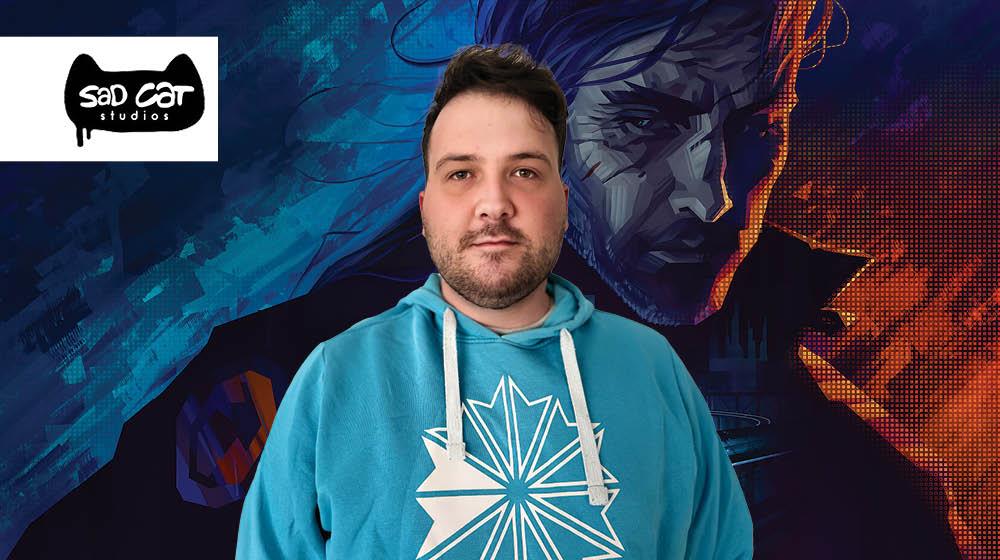Igor Gritsay, the Co-founder, Sad Cat Studios, suggests that transmedia products, such as movies and TV adaptions, help the industry make more non-gamers understand what they are missing.
“The great thing about games is that they can be anything you want them to be, from purely gameplay-driven fun like Rocket League or Tetris to movie-like giants such as The Last of Us, while having a lot of interesting stuff in between, like Baldurs Gate 3, for example,” he notes.
Speaking to GOLD magazine as part of a cover story featuring 18 of the top gaming developers based in Cyprus, he also talks about what attracted Sad Cat Studios to Cyprus and recommends what steps could be taken to ensure the island remains a location of choice.
How did the focus on console games, particularly in the 2-D science-fiction, retro-futuristic action genre, come about?
Most of our core team comes from a mobile Free-to-play (F2P) game development background. You do get tired after a while, when the only variable you deal with is persuading players to spend their money. We all took the chance of doing something of our own and started brainstorming. At that time, we were inspired by the short-lived revival of the cyberpunk genre in movies – with the release of absolute gems like Bladerunner 2049 and Upgrade. We went for 2-D, mostly for cost-saving reasons but that has since become a distinctive visual feature of our work.
Walk us through Replaced and the reasons that you expect to contribute to its success when it is released.
Replaced is our attempt at creating an AAA ‘indie’ game. This can be seen in our 2021 and 2022 trailers but we are aiming for something more than just visuals, although we know that they are often key to making a proper first impression. Our game is all about the survival of a creature that knows nothing about the ruthless world it finds itself in. The combat aspect of our game was inspired by the Batman Arkham series and we believe that we have done a pretty good job of delivering a satisfying and challenging combat system, with a cinematic flavour. We can already see that this is something players are interested in – our trailers have accumulated several million views, while the game itself reached the top 100 of Steam’s wishlist. Our main goal now is to fulfil these high expectations.
HBO’s success with The Last of Us and collaborations between acclaimed filmmakers and game creators like Jordan Peele and Hideo Kojima suggest that gaming is on the way to becoming the dominant entertainment medium. What prospects do these developments open for game developers?
This is a great way for the games industry to prolong its growth streak. Phenomena like The Last of Us provide new entry points for people who were never interested in gaming (or never had a chance to check it out). The great thing about games is that they can be anything you want them to be, from purely gameplay-driven fun like Rocket League or Tetris to movie-like giants such as The Last of Us, while having a lot of interesting stuff in between, like Baldurs Gate 3, for example. Transmedia products can help us make more people understand what they are missing. It works in both directions and between various media: this year we had an amazing One Piece TV adaptation, which has contributed to the success of the original manga series, even though it already had legendary status.
Given the growing popularity of e-sports and its evolution into a major sporting event, including an annual e-sports World Cup to be held in Saudi Arabia, what opportunities does this remarkable surge present for game developers?
Just as with TV adaptations, it broadens the potential player base and helps us change the perception of games and e-sports by a mainstream audience. I would even go as far as saying that e-sports has the potential to drive even more investment in the industry, since those games are much more scalable than traditional single-player games and have a much longer lifespan. On the flipside, endless games tend to create something of an oligopoly situation, where several major companies have total dominance over the market, since players have a limited amount of time. Very few people can play Counter Strike, Valorant and Dota2 and still have time left for single-player experiences.
Your studio, among others developing console and PC games, has chosen to establish itself in Cyprus. What specific attributes make the island an appealing destination for you?
I would say that it’s a combination of features that makes Cyprus what it is. Its location allows many teams to create decentralised structures, so it’s possible to work with people from all over the world (though I would say that Australia and New Zealand are still too far away!). It’s part of the EU, so its residents can travel freely across many countries, which also simplifies running a business. For years now, Cyprus has been accumulating industry specialists in one place, so it’s very easy to get to a meetup or a networking session. This is basically how we met the folks from GEM Capital, who have been a great help to us and many other Cyprus-based game development companies.
The recent decision by the House of Representatives to reduce the naturalisation period for C-level executives to four years reflects efforts to establish Cyprus as an IT and games hub. What other changes, policy or otherwise, do you believe would further support this goal?
Current events in the world have actually made it a bit harder to get new people to Cyprus. Delays at embassies can last several months, so it’s not very convenient, especially if you want to hire somebody with a unique set of skills with time being of the essence. Aside from that, Cyprus could introduce some more games industry-specific initiatives. Some European countries, like the UK, offer grants specifically for the games industry or apply special taxation regimes for games companies, which helps create a favourable business climate.
(This interview first appeared in the January edition of GOLD magazine. Click here to view it.)









